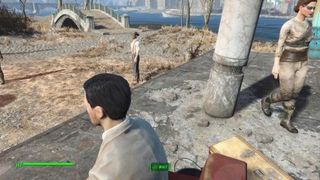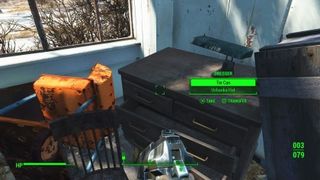Fallout 4: the good, the bad and the ugly of the Boston Wastelands
Welcome home
When you have taken a settlement for your own, 'build mode' highlights objects in the nearby area that can be turned into scrap, while you'll also be able to place crafted items wherever you so wish, so long as there's space. The system is very Sims-esque; you can (and probably will) sink hours into designing your settlements exactly how you want them.
Speaking of building, you'll want to make the effort to look after your power armour, which plays a bigger part in Fallout 4. Fusion Cores are the life-source of your armour but they're not exactly in bountiful supply around the Wasteland. You'll want to make sure you're collecting the right materials so you can fix up your armour when next in your workshop - you'll be thankful when it saves your life in some of the game's tougher parts.

We liked: A protagonist that actually talks
Some people argue that a silent protagonist helps them to feel more immersed, and Fallout 3 and New Vegas opted for a voiceless hero. That's why it was a surprise when Bethesda revealed that the character you choose to play in Fallout 4 would speak, with Courtenay Taylor and Brian T. Delaney voicing the female and male protagonists respectively.
It was even more surprising when we decided this was a good decision: conversations feel a bit less stilted and the use of voice acting allows the game to hit more emotional beats - when the voice acting and the animations sync up, at least. It's a choice that feels right for Fallout 4's storyline, especially later in the game, but we won't spoil anything beyond that.
Speaking of the story, this is the most engaging Fallout storyline yet. As you should know by now, it involves you waking up after hundreds of years of cryogenic freezing to a post-apocalyptic world where your son has been kidnapped - and it's your goal to find him. And like previous games, you'll be tempted to go off-track and deal with the many side quests. In Fallout 4, you really feel like most of these matter, whether it's earning favour with certain factions such as the Brotherhood of Steel or just helping someone out.

We disliked: ...that the dialogue isn't very complex
That said, there feels like less diversity in the dialogue options than in previous games. You'll either politely accept a quest or politely decline it - the options here aren't as wildly different as the game's enemies or NPCs. There's even a character or two that can be heard repeating the same line every time you turn in a quest to them. We've been down this road before when a particular guard in Skyrim repeatedly made the now-internet-famous quip "I used to be an adventurer like you … until I took an arrow to the knee" and while we couldn't find anything that annoying in our first 20 hours with the game, a few characters toe the line.

We liked: A better looting experience
Looting for items has always been one of the cornerstones of the Fallout franchise, and that's no exception in Fallout 4. Until now, searching an object has meant opening up a menu that would pause the game while you rifle through items to decide what's worth taking. In Fallout 4, the items a person/cupboard/whatever is containing will appear when highlighted with your aim sight, and you'll be able to scroll through and take items without stopping the game. It makes looting far less of a chore and lets the action flow much better.
Get daily insight, inspiration and deals in your inbox
Get the hottest deals available in your inbox plus news, reviews, opinion, analysis and more from the TechRadar team.

We liked: how much your stats actually affect gameplay
In previous games, the biggest decision you ever make is made within the first 10 minutes. Where you allocated your S.P.E.C.I.A.L. (Strength, Perception, Endurance, Intelligence, Agility, Luck) irrevocably determined the fate of your character. You were either a brutish black powder gunslinger or a stealthy scientist type, a luck-dependent thief or a silver-tongued rogue. But never everything at once.
Nick Pino is Managing Editor, TV and AV for TechRadar's sister site, Tom's Guide. Previously, he was the Senior Editor of Home Entertainment at TechRadar, covering TVs, headphones, speakers, video games, VR and streaming devices. He's also written for GamesRadar+, Official Xbox Magazine, PC Gamer and other outlets over the last decade, and he has a degree in computer science he's not using if anyone wants it.

